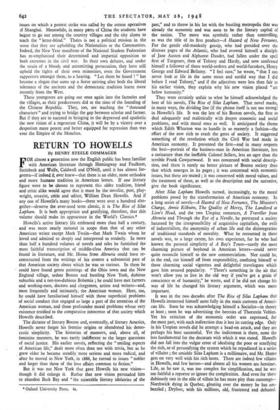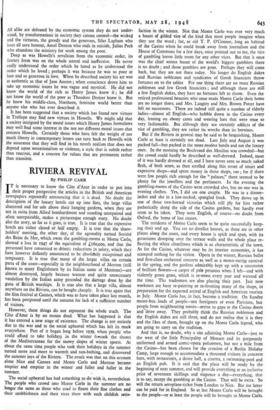RETURN TO HOWELLS
By HENRY STEELE COMMAGER
FOR almost a generation now the English public has been familiar with American literature through Hemingway and Faulkner, Steinbeck and Wolfe, Caldwell and O'Neill, until it has almost for- gotten—if indeed it ever knew—that there is an older, more orthodox and more humane tradition in American letters. If one literary figure were to be chosen to represent this older tradition, friend and critic alike would agree that it must be the novelist, poet, play- wright, essayist, critic and editor, William Dean Howells. And if any one of Howells's many books—there were over a hundred alto- gether—deserve the over-used term classic, it is The Rise of Silas Lapham. It is both appropriate and gratifying, therefore, that this volume should make its appearance in the World's Classics.*
Howells's active literary life embraced more than half a century, and was more nearly national in scope than that of any other American writer except Mark Twain—that Mark Twain whom he loved and admired so deeply and interpreted so tenderly. In more than half a hundred volumes of novels and tales he furnished the most faithful transcription of middle-class America that can be found in literature, and Mr. Homo from Altruria could have re- constructed from the writings of his creator a substantial part of that American society about which he was so curious. In them he could have found genre paintings of the Ohio town and the New England village, sedate Boston and bustling New York, dubious suburbia and a not-too-dubious Bohemia ; he could have met farmers and working-men, doctors and clergymen, artists and writers—and, most frequently and intimately, the American woman. Here, too, he could have familiarised himself with those superficial problems of social conduct that engaged so large a part of the attention of the American woman, and those profounder moral problems whose very existence testified to the comparative innocence of that society which Howells described.
The dictator of literary Boston and, eventually, of literary America, Howells never forgot his frontier origins or abandoned his demo- cratic simplicity. The historian of manners, and, above all, of feminine manners, he was rarely indifferent to the larger questions of social justice. His earlier novels, reflecting the "smiling aspects of American life," dealt more often than not with trivia, but as he grew older he became steadily more serious and more radical, and after he moved to New York, in 1886, he turned to issues "nobler and larger than those of the love affairs common to fiction."
But it was not New York that gave Howells his new vision— though it did enlarge it. Rather that new vision persuaded him to abandon Back Bay and "the miserable literary idolatries of the
*Oxford University Press. 4s.
past," and to throw in his lot with the bustling metropolis that was already the economic and was soon to be the literary capital of the nation. The move was symbolic rather than controlling, as was the title of its first product—A Hazard of New Fortunes. For the gentle old-maidenly gossip, who had presided over the discreet pages of the Atlantic, who had avowed himself a disciple of Jane Austen and Alphonse Daudet, had fallen under the spell first of Turgenev, then of Tolstoy and Hardy, and now confessed himself a follower of those world-seekers and world-forsakers, Henry George and Edward Bellamy. "I feel sure," he wrote, "that I can never look at life in the same mean and sordid way that I did before I read Tolstoy," and if the adjectives were less than fair to his earlier vision, they explain why his new vision placed "art below humanity."
They were certainly unfair to what he himself acknowledged the best of his novels, The Rise of Silas Lapham. That novel marks, in many ways, the dividing line (if the phrase itself is not too strong) in Howells's life. It was the last of his Boston novels, the first to deal adequately and realistically with deeper economic and social problems, and with moral ones as well. It anticipated the theme which Edith Wharton was to handle in so masterly a fashion—the effort of the new rich to crash the gates of society. It suggested something of the revolution which the Civil War had made in American economy. It presented the first—and in many respects the best—portrait of the business-man in American literature, less a caricature than the ineffable Colonel Sellers, less an ogre than the terrible Frank Cowperwood. It was concerned with social descrip- tion, and there is surely no better picture of Boston society than that which emerges in its pages ; it was concerned with economic issues, but these are muted ; it was concerned with moral values, and the treatment of these, as well as the description and the narrative, give the book significance.
After Silas Lapham Howells turned, increasingly, to the moral problems posed by the transformation of American economy. In a long series of novels—A Hazard of New Fortunes, The Minister's Charge, Annie Kilburn, The Quality of Mercy, The Landlord at Lion's Head, and the two Utopian romances, A Traveller from Altruria and Through the Eye of a Needle, he portrayed a society harassed by the irresponsibility of acquisitive capitalism, the evils of industrialism, the anonymity of urban life and the disintegration of traditional standards of morality. What he recounted in these novels was, to a large extent, his own experience, for he who had known the pastoral simplicity of A Boy's Town—surely the most charming picture of boyhood in American letters—could never quite reconcile himself to the new commercialism. Nor could he, in the end, cut himself off from responsibility, confining himself to those charming social vignettes and delightful travelogues which gave him assured popularity. "There's something in the air that won't allow you to live in the old way if you've got a grain of conscience or of humanity," he wrote, and if he did not change his way of life he changed his literary argument, which was more important.
It was in the two decades after The Rise of Silas Lapham that Howells immersed himself most fully in the main currents of Ameri- can life. Soon he was acknowledging himself a Socialist—in theory at least ; soon he was advertising the heresies of Thorstein Veblen. Yet his criticism of the economic order was expressed, .for ' the most part, with such indirection that it lost its cutting edge. Only in his Utopian novels did he attempt a head-on attack, and they are perhaps his least successful. Yet the indictment is there, none the less fundamental for the decorum with which it was stated. Howells did not fall into the vulgar error of idealising the poor or scarifying the rich, or of personifying the system which he repudiated in a series of villains ; the amiable Silas Lapham is a millionaire, and Mr. Homo gets on very well with his rich hosts. There are indeed few villains in Howells, and few heroes—and almost all his women are heroines. Life, as he saw it, was too complex for simplification, and he was too faithful a reporter to ignore the complexities. And even for those dubiously cast in the role of villain he has more pity than contempt- Northwick dying in Quebec, gloating over the money he has em- bezzled; Dryfoos, with his millions, old, frustrated and defeated. All alike are defeated by the economic system they do not under- stand, by transformations in society they cannot control—the wicked and the virtuous, the greedy and the generous, Silas Lapham who loses all save honour, Ansel Denton who ends in suicide, Julius Peck who abandons the ministry for work among the poor.
Deep as was Howells's revulsion from the economic order, its literary form was on the whole unreal and ineffective. He never really understood the order which he hated as he understood the order which he loved ; perhaps it was because he was so poor at hate and so generous in love. When he described society his art was as authentic as that of Jane Austen ; when conscience drove him to take up economic issues he was vague and mystical. He did not know the world of the rich as Henry James knew it ; he did not know the world of the poor as Theodore Dreiser knew it. But he knew his middle-class, Northern, feminine world better than anyone else who has ever described it.
It has been suggested that a society which has found new virtues in Trollope may find new virtues in Howells. We might add that a society intrigued by the moral issues which Henry James formulates may well find some interest in the not too different moral issues that concern Howells. Certainly those who have felt the weight of too much liberty in contemporary letters can turn back to Howells with the assurance that they will find in his novels realism that does not depend upon sensationalism or violence, a style that is subtle rather than raucous, and a concern for values that are permanent ratha than transient.































 Previous page
Previous page